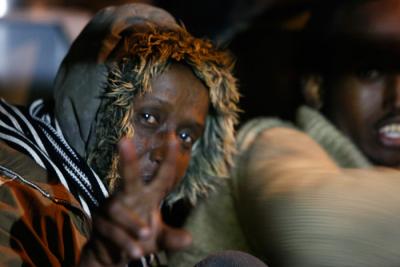Advocacy is a key element in UNHCR’s activities to protect refugees, asylum seekers, and stateless persons. It is a cornerstone of protection strategies, used in combination with activities such as information dissemination, monitoring and negotiation.
These can help transform policies and services on national levels to better protect persons of concern to UNHCR.
Since 2017-18, the UNHCR Malta Protection Unit has developed two projects with various national stakeholders. One project focuses on improving access to protection, and the other on protecting persons of concern from SGBV:
Project with JRS: : UNHCR collaborates with the Jesuit Refugee Service in Malta to provide legal services and information to Persons of Concern (PoCs) in detention, open centres and in the community. UNHCR also works with JRS Malta to identify and refer persons with particular vulnerabilities and special needs, and provide them with the necessary support. Furthermore, as part of UNHCR strategy on the prevention of and response to Sexual and Gender-Based Violence, a specific component of the project with JRS has been dedicated to this topic which includes also the cooperation with Women’s Rights Foundation. The organizations are working together to facilitate a network of service providers working with SGBV survivors, and to offer legal assistance to persons of concern who wish to seek legal redress for the harm they suffered.
Project with national stakeholder on SGBV: in the context of UNHCR activities on the prevention of and response to Sexual and Gender-Based Violence, in 2018 UNHCR started cooperating with several national stakeholders to set an effective SGBV referral pathway and better coordinate the work of the relevant organisations involved. UNHCR Malta also launched a joint project with JRS and Women’s Rights Foundation. The organisations are working together to facilitate a network of service providers working with SGBV survivors, as identified by JRS and subsequently referred to WRF. The aim is to offer free legal assistance and financial support to cover legal costs and court fees to beneficiaries of protection who wish to seek legal redress for the harm they suffered.
Other Key highlights of Protection activities in Malta:

Monitoring reception and access to protection in open centres & Initial Reception Centre (IRC)
UNHCR protection staff regularly visit open centres and the IRC to provide information on the asylum system, Dublin regulation, rights and obligations of asylum seekers in Malta and to refer persons of concern to appropriate services. UNHCR also advocates for the improvement of the reception conditions of applicants for international protection by reporting observations and recommendations on a regular basis. UNHCR uses the observations and information collected during visits to advocate for better conditions and fairer processes for persons of concern to UNHCR.

Monitoring reception of detention centres and advocacy for the implementation of alternatives to detention
UNHCR conducts monthly visits to the Safi detention centre to monitor conditions. We are also continuously exploring ways of promoting alternatives to detention in Malta. UNHCR Malta is currently taking part in the Global Detention Strategy to support governments to end the detention of asylum-seekers, refugees and children. (photo:www.isleanders.com/2014)

Advocacy for improving the legal framework, access to protection and services available for PoCs
The Protection Unit does this in collaboration with the Durable Solutions unit and Public Information Unit through a variety of activities, workshops, meetings with stakeholders, trainings, drafting of documents outlining our recommendations and media campaigns.

Child Protection and SGBV prevention and response
Monitoring and strengthening mechanisms available in Malta by focusing on data management, capacity building, partnerships and coordination, and promoting the sharing of training resources.

Training for interpreters working with refugees in Government agencies, police, courts, NGOs, etc
UNHCR provides regular training for all interested interpreters working with different government agencies. This training focuses on how to be an effective and professional interpreter.

Advocacy strategy on reception by reporting observations and recommendations on a regular basis
UNHCR uses the observations and information collected during visits to advocate for better conditions and fairer processes for persons of concern to us. We do this through the drafting of policy documents and recommendations, administering trainings and supporting the Government to develop better practices and stronger systems.

Relationship and capacity building including training with government agencies & refugee communities
UNHCR has, over the years, developed a positive working relationship with the Government of Malta and works collaboratively on key issues in order to improve access to protection for all persons of concern. Recently, refugee-led community organisations have also been put in contact with key state entities and have made positive contributions to the improvement of the situation for refugees and other beneficiaries of protection in Malta

Monitoring Refugee Appeals Board decisions and advocacy for the RAB reform
UNHCR monitors and assesses the decisions made by the RAB and provides support on certain cases. UNHCR can also provide training, information and guidance to facilitate the decision-making process.

Advocacy for legal pathways for refugees
UNHCR advocates for legal pathways for asylum seekers to access protection in Malta and offers support to the Government of Malta in the selection of persons to be resettled to Malta from outside the EU. In this context UNHCR has monitored the implementation of the Relocation and Resettlement programmes: in 2016 and 2017 the Government of Malta positively fulfilled its commitment by relocating to Malta 168 asylum seekers from Greece and Italy under the relocation programme. In 2017, the Government of Malta also resettled 17 Syrian nationals under the EU-Turkey agreement who have been granted Local Subsidiary Protection. UNHCR staff have monitored the implementation of these programmes and provide support and recommendations to the Government where required.

